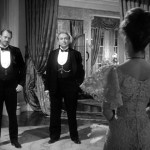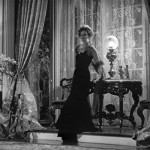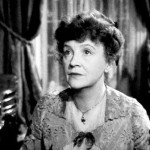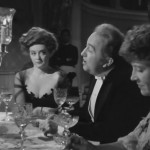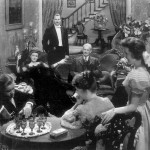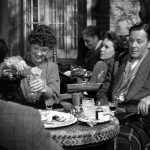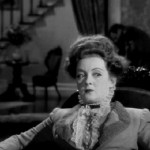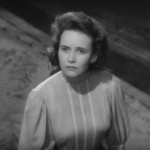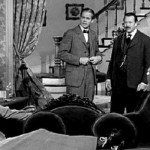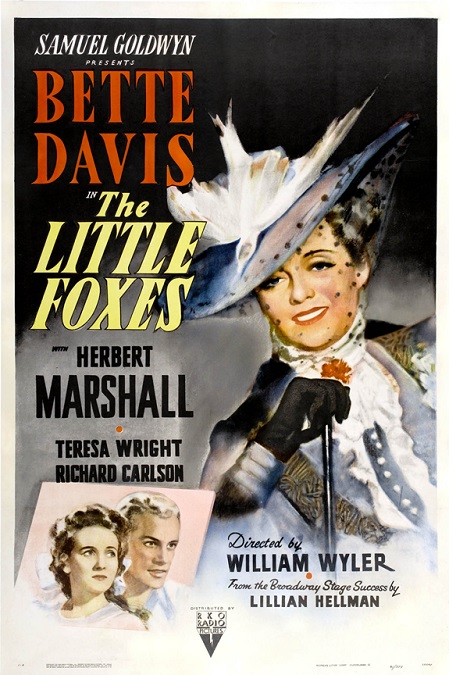
The Little Foxes – 1941
Once again, Bette Davis plays a mean and vicious woman who is willing to stoop to murder to get what she wants. True, she does a good job with such a part, so I guess I can’t blame her. There was the Letter and Whatever Happened to Baby Jane, just to name two. Sure, Davis played many other kinds of characters, but these seemed to be some of her more memorable roles. But even parts that didn’t require her to be a murderess seem to have had an acerbic edge that one could call a recurring theme in her career.
In The Little Foxes, we see her play Regina Giddens, a Southern aristocrat who struggles to gain wealth and power. However, as a woman in the early 1900s, she is completely dependent on her husband for her financial security. Her husband, Horace, played by Herbert Marshall, who also played her husband in The Letter, is a sick man who is being treated for a weak heart. Their sweet and innocent daughter, Alexandra, played by Teresa Wright, is a good girl who seems to be uninfluenced by her parents hateful fighting and her mother’s selfish scheming.
When Regina attempts to go into a lucrative business deal with her two brothers, Ben and Oscar, played by Charles Dingle and Carl Benton Reid, respectively, Horace refuses to give her the funds to complete her part of the transaction. They fight even more. Anyway, to make a long story short, Oscar’s son Leo, who works at a bank, is able to steal railroad bonds from Horace’s safety deposit box, thus obtaining the money they need in a way that shuts Regina out of the deal.
Horace learns of the theft and tells Regina that he will claim the stolen bonds to be a loan, ensuring that Regina will have no part in the deal. But he has a heart attack before such a claim can be made. Regina, sees the heart attack happen, and through deliberate inaction, allows him to die. She uses her knowledge of the theft to blackmail her brothers into giving her a seventy-five percent share of the business deal. Alexandra figures out what Regina has done and leaves her, wealthy, but alone.
So here is what I can’t figure out. I’d call that murder, even though she did not cause the heart attack that killed her husband. How did the Hays code let her get away with it? It was cold and calculated, and perhaps even pre-meditated. How was the character allowed to get away with it without being punished for her evil inactions?
Anyway, there were several performance that I’d like to mention as being noteworthy. Charles Dingle’s portrayal of the shady businessman, Ben, did a good job of playing sin with a smile. Even when he is bested by his sister in the end, his smile and gracious Southern manners in the face of his defeat was charming and well played. I also liked Herbert Marshall’s portrayal of Horace. I have never seen him in a role that I didn’t enjoy, and this was no exception.
But one of the more dramatic characters in the film was Birdie Hubbard, Oscar’s physically and emotionally abused wife, played by Patricia Collinge. The scene in which she has her drunken breakdown, in which she admits to not liking her dishonest son, Leo, was not exactly deep or gut wrenching, but it was a little island of unexpected emotion in an otherwise cold and dispassionate film. But I got it. I understood that the lack of emotions in the three siblings was a plot point. Either way, Collinge did a good job with her role. We had already seen her husband strike her across the cheek so we can at least sympathize with her when we see her drink herself into such a powerful confession.
But Davis, of course, was their big star, and it was she whom the audiences loved to watch on the big screen. I thought Davis did a competent job, but I felt that she could have done better. In my research, I found that the movie’s director, William Wyler, had instructed Davis to see Tallulah Bankhead play the part in the 1939 Broadway production. Not wanting to be influenced by Bankhead’s performance, she reluctantly agreed. Bankhead had portrayed Regina as a victim forced to fight for her survival due to the contempt with which her brothers treated her, but Davis played her as a cold, conniving, calculating woman. Maybe Davis should have followed her lead, though in later years, Davis praised Bankhead, and blamed Wyler for the different interpretation of the part.
